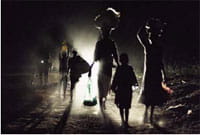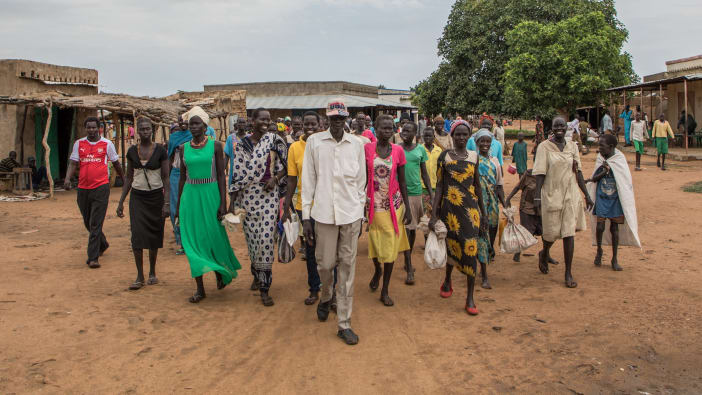The main PAG church in Akoboi had been through Church and Community Mobilisation Process training over the previous three years. The training prepared them to think creatively about how they could respond to the needs of the community. This meant they were able to respond quickly and efficiently when the migrants arrived in their village. Five local PAG congregations were also motivated to contribute to the response, led by the pastor of the main church.
Response
When the migrants arrived, the church leaders gathered to discuss what to do. They decided that the main church would care for the majority of the people, but that each local congregation would look after at least one family. They also decided to provide the following:
SHELTER
In the grounds of the main church, church members worked with the migrants to build 15 huts. These housed 15 of the families. The other ten families were taken into the homes of church members.
FOOD AND FIREWOOD
Food and firewood were given to the migrant families until they could earn money and collect firewood for themselves.
WATER
A local NGO heard about the migrants taking refuge in Akoboi, so they dug a well on the church premises to provide safe drinking water.
PRAYER AND FELLOWSHIP
Throughout the year, church members made friends with the migrants and prayed with them. The migrants were also invited to attend church services.
The local churches received no external funding for their work with the migrants. People from the church and the community gave their time, food and materials to support the needs of the migrants.
Challenges Three of the main challenges faced by the church and community during the year were:
- Community members were poor and had limited resources. While caring for the migrants, many of the community members ran short of food themselves in the weeks before the harvest.
- The migrants did not always have the same values as the church members which caused tension on occasions.
- An NGO came to the village asking the migrants questions about their situation, which raised expectations. Unfortunately the NGO never returned and the migrants frequently asked the pastor to find out more when visiting Soroti.
Lessons learnt
The pastor and church members have said that if they were to repeat the work, they would do the following things differently:
- They would encourage more people from the community to respond, and not leave the church members to do most of the work.
- A committee would be set up to oversee the care of the migrants, so that the response is not managed informally by the pastor who has other responsibilities.
- Community leaders would be part of this committee from the beginning of any response.
The future
The church will build up resources to use in the event of something similar happening again. To raise funds, church members are planting citrus and other trees so that they can sell the produce.
Results
The migrants stayed in Akoboi for about one year before it was safe enough to return to their homes in the north of Uganda. As a result of the response of the PAG church in Akoboi, 66 migrants were helped during this time. The migrants were very grateful for the help given. They expressed this by giving the community a celebration meal before returning home and by naming their newborn babies after the pastor and members of the church. They also invited the pastor and others to visit them in their village once they had settled back.
Before this response, community members viewed the church as a place where people ‘clap their hands and shout’. As a result of the church’s response, the community now sees the church as a valuable group of people who help those in need. The pastor attends community council meetings and his opinion is valued. The members of the church have confidence and a new sense of purpose.
The church also realises now that it is better to give than to receive and that God has honoured their faithfulness. They see the well on the church premises, which will be a source of safe water for years to come, as a gift from God for all they have done in helping others in need.
This article is based on a longer case study by Andrew Bulmer. He is an independent consultant who specialises in church and community mobilisation.
For more information contact:
Jane Achaloi, PEP Coordinator for PAG, Plot 9 Bandali Rise, Bugolobi, PO Box 10113, Kampala, Uganda.
Email: [email protected]
What is the Church and Community Mobilisation Process?
This is a series of workshops, discussions and Bible studies which are used to help church members understand that they have a responsibility to address poverty and injustice. The church works with the community in assessing and prioritising needs, and in assessing the resources that God has given them to tackle these issues. They then take practical steps to make a positive difference to their situation.
For more information visit the Churches page on www.tearfund.org/tilz











